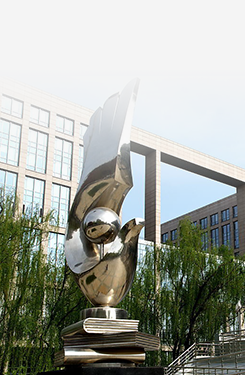Presenter:Nikos Varsakelis,Aristotle University of Thessaloniki
Invited:Prof. Fan Ying
Location:A618
Date:2019年.5.14
Title:Regional Innovation Convergence;The web in Economics and Business
Time:10:00-11:30;16:30-18:00
About the presenter:
Nikos Varsakelisis Professor of Industrial Policy in the Department of Economics of the Aristotle University of Thessaloniki where he teaches microeconomics, advanced macroeconomics at the undergraduate level and economics of innovation and knowledge in complex systems at the graduate level. His research interests are in the fields of European Integration, Industrial and Technology Policy, and Multinational Firms. He has published articles in scientific journals on topics such technological development, regional knowledge diffusion, entrepreneurship development, and foreign direct investment. He has presented many papers in international conferences. He has served as referee for many international journals and international organizations. He served as National Expert for the Directorates General II and XV of the Commission of the EU and research project evaluator for the EU, the Swiss Research Organization and the Georgia Research Organization. He was visiting scholar at the University of Alicante (Spain) and University of Copenhagen (Denmark). He has given many lectures and seminars, as invited speaker, for many institutions and universities. He directed the Laboratory of Economic Analysis and Policy from 2010 to 2014. He is vice-rector of the Aristotle University of Thessaloniki since 2014.
Abstract:
1. Regional Innovation Convergence
Two important questions emerge from the existing literature on regional innovation: i) is the convergence of regional innovative activities feasible in the long term? And ii) does a region absorb knowledge from the total public domain (global knowledge) and are cross-regional knowledge transfer bidirectional and unequal in size? To address these questions, a Markov model is applied on data covering 246 European regions for the period 1995-2006. The findings suggest that no σ-convergence, for each sample year, the vector of the average yearly number of patents and the estimated eigenvector is observed either in the overall sample or across groups. The mobility across groups of regions is also limited. The next step is to investigate the impact of intra-regional and inter-regional knowledge spillovers on regional new knowledge production. The application of a knowledge production function indicates that the returns to scale with respect to the main inputs of the KPF, are increasing with the absence of spillovers and decreasing when knowledge spillovers exist. Technological diversity facilitates the creation of new ideas and knowledge. The cross regional technological proximity is positive and statistically significant. The spatial proximity is also positive and statistically significant. However,thesimultaneous consideration of the spatial and technological proximity significantly influences the marginal effects of these independent variables on new knowledge creation. Thus, when a region is geographically contiguous to weak innovative systems then the knowledge spillovers are stronger between regions which innovate in similar technological fields. When a region is geographically contiguous to regions with high innovative activity the knowledge spillovers are stronger between regions which innovate in different technological fields. Finally, the location of a recipient region on the technological fields’ trajectory influences the impact of the technological distance on knowledge transfer. And what is the role of universities?
2. The web in Economics and Business
The web is comparable to the industrial revolution of the 18th-19th century.The web economy is different from the physical economy in terms of: Leveraging information, knowledge and speed of coordination and cooperation between trading partners. The Web and Economic Growth or how a macroeconomist see the things! The role of knowledge and where does the web come into the picture? Significant in the elimination of the regional isolation. Even more, the webaffectsthe short run macroeconomic policy. The web and the market. Many of the business activities involved in selling physical products , including design, customization, ordering, tracking, customer relationship management, are being conducted online providing firms new ways to create value and to achieve new heights of operating efficiency. Uncertainty both for firms and customers. The web offers to firms and customers disclosure of information concerning the firm. The web helps the adaptation to the rapidly changing environment. On the other hand, web leads to speed out the changes. Distribution channels and access to customers. Buyer’s vs sellers? For example the price discrimination: due to the web the seller could exploit all the available information to discriminate in order to get the higher consumer surplus.But on the other hand,the web reduces the search cost for the buyer. The web has also a significant impact on the production process.

